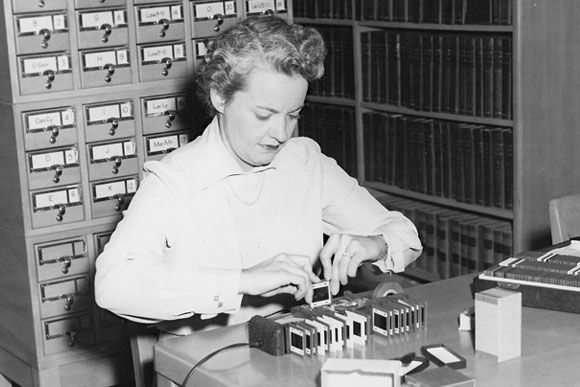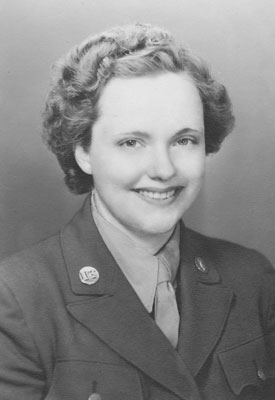
Adventures of a truck driver-librarian-lawyer
UMKC Conservatory of Music and Dance alumna Margareth Owens (B.M. ’77, M.M. ’78) exudes pride when she talks about the life of her mother, Alice (Tanner) Boyer (L.L.B. ’51), who passed away in 2002. And why wouldn’t she? It’s the story of a soldier, legislator, lawyer, teacher and mother. And truck driver.
When war came to the United States in 1941, Boyer was a graduate student at Kansas City University. She soon joined the newly formed Women’s Army Auxiliary Corps. When asked what would compel a young female graduate student to enlist, the answer made perfect sense: “She said all of her professors had quit to go to war, so she did, too,” Owens said. “After she completed basic training, she was assigned to the motor corps—she drove a truck.”
Boyer’s job as an Army truck driver was brief, however. When the Army learned she was educated, it sent her to England where she was assigned to a unit that tracked troop movements leading up to D-Day. She was then assigned to the Counter Intelligence Corps, and after Germany surrendered, she was placed with the U.S. Army Office of Military Government in Berlin. “She looked at it as a great adventure and a real opportunity to serve her country,” Owens said.

The military was not the end of her service. Just a few years after coming home from the war at the age of 26, Boyer took on her next adventure. “She stood for election in 1946 and won,” Owens explained. “She served on the Missouri State Legislature from 1947 to 1948 and represented the 9th District of Jackson County.”
Inspired by her position as a lawmaker, Boyer enrolled in the Kansas City University School of Law in the fall of 1947, and like most of the challenges she took on, she did so without hesitation. “She’d been a woman in a man’s world in the army during World War II,” Owens said. “Law school was also a man’s world, but it held no terrors for her. She worked a full-time job, traveled to Jefferson City, Mo., for the legislature and attended night classes at KCU law school at the same time.”
Boyer didn’t stay in politics after finishing law school. “She liked making laws,” Owens said, “but I don’t think the politics part fit for her.” Instead, she took a job at the law school and was the law librarian when the KCU law library moved into the new building. To prepare for the move, every student checked out a certain number of books at the old library, then had to check them back in at the new library building. Boyer’s service at the university didn’t end there. While the law school didn’t have a woman credited as an official assistant professor until 1958, Boyer was an instructor from 1951 to 1953, teaching courses in criminal law, military law, restitution and statutory construction.
After leaving the law school faculty, Boyer’s law practice was limited to mostly pro bono work. Owens says with pride that her mother left the law school to do what women did in the 1950s: raise a family.
A wife, mother, student … and Marine
When Linda Roth (M.Ed. ’77) earned her bachelor’s degree, she felt the need to give back. “I wanted to do something: the Peace Corps, VISTA, those organizations,” she said. “But I wasn’t sure I could handle dirt and bugs.” So she interviewed with the different branches of service and liked how the Marine Corps treated her.
Unrest over the war in Vietnam made it a time in history when the military wasn’t the most popular way for college students to serve their community and country. But Roth says the atmosphere was different at her school, the University of Tulsa, and she didn’t hesitate to sign up. “Nobody said, ‘You can’t do that,’ ” she said. “The war wasn’t popular, and I wasn’t necessarily a supporter of the war. But I wanted to do something, and it seemed like the right thing to do.” Roth said she also liked the challenge. “There were people who said I didn’t look strong enough to be a Marine and who told me I’d never survive the Marine Corps. You don’t tell me I can’t do something.” So, she joined the Marines.
“These were not just good professors at UMKC— schools all over the country used their books.”
– Linda Roth
Roth married a fellow Marine Corps officer and was serving as a training support officer at Camp LeJeune, N.C., when she became pregnant. Honorably discharged as a first lieutenant, her next challenge was awaiting her. Her husband left on assignment to Okinawa, Japan, and she moved the family to Kansas City. “While he was gone, I thought I’d get my master’s degree, not realizing how difficult it would be with two kids,” she said. Using her GI Bill benefits, Roth finished her master’s in Reading Education. “It was a great program,” she said. “I had Professors Emeritus of Education Helen Huus, Tony Manzo and Warren Wheelock. These were not just good professors at UMKC— schools all over the country used their books.”
